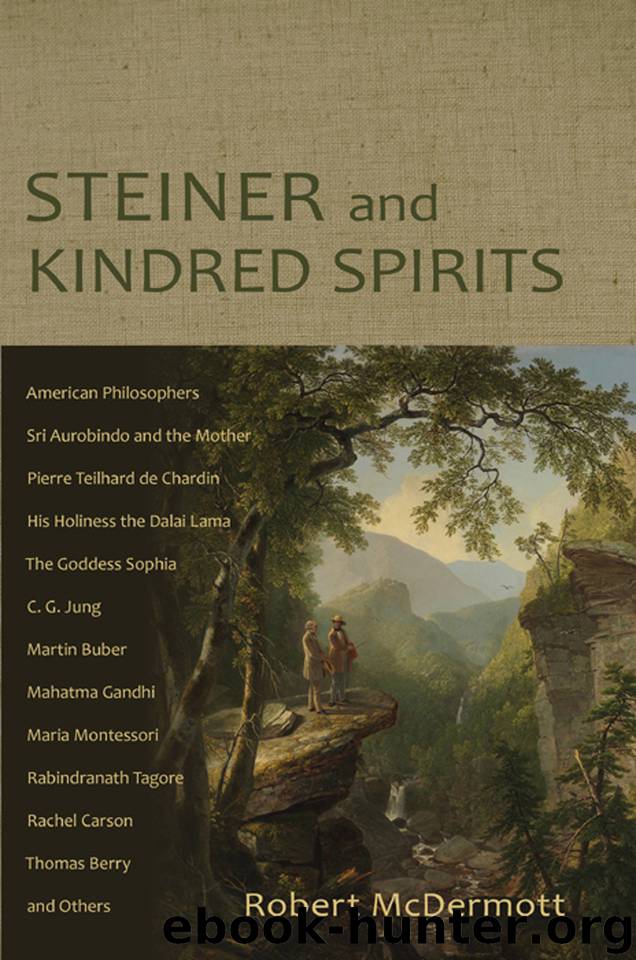Steiner and Kindred Spirits by McDermott Robert

Author:McDermott, Robert [McDermott, Robert]
Language: eng
Format: epub
Publisher: SteinerBooks
Published: 2015-09-06T16:00:00+00:00
7
God, Evil, and Suffering
Introduction: Martin Buber, C. G. Jung, and Rudolf Steiner
T his chapter compares some of the leading ideas of three great religious thinkers on the topic of theodicy—the philosophical attempt to explain the existence of suffering and evil in relation to belief in a just and loving God. I feature three deep thinkers who devoted their lives to curing the spiritual ills of modern Western humanity: Martin Buber, who was deeply related to Judaism, had an affinity with several existentialist themes, and offered the practice of “I and Thou” and dialogue as cures for modern Western malaise; C. G. Jung, who sought to heal the psychological ills of individuals and modern Western culture; and Rudolf Steiner who brought spiritual and esoteric insights for the enlivening of thinking, feeling, and willing.
These three great twentieth-century European religious thinkers wrote in the German language, though none was of German nationality: Martin Buber was Polish–Jewish, C. G. Jung was Swiss, and Rudolf Steiner was Austrian. Because of their religious and spiritual orientations, they each struggled with challenges posed by the Enlightenment, the philosophy of Immanuel Kant, twentieth-century positivism and skepticism, and more generally the secular worldview of twentieth-century European thought and culture. In a remarkable coincidence Buber, Jung, and Steiner each at the age of fourteen began to read, and confront in a life-defining way, Kant's Critique of Pure Reason (1781). This work defined the philosophical task for the nineteenth and twentieth centuries, and more specifically set the limits to theoretical knowledge concerning God, human freedom, and human immortality.
In the opinion of these three thinkers, modern Western humanity suffers from a variety of illnesses including disenchantment, alienation, fragmentation, anxiety, and meaninglessness, all due to a broken connection with the divine (variously understood). To address these and other profound illnesses, Buber brought biblical faith and an “I–Thou” way of life. In his classic text I and Thou , Buber inspires the reader to respond to another so as to experience in that person the presence of the Eternal Thou, understood in the Jewish tradition as the God of Abraham, Isaac, and Jacob. Because his commitment was to religious and moral experience, and not to pure theoretical knowledge, Buber did not object to Kant's denial of theoretical knowledge of God, human freedom, and human immortality.
Jung developed methods by which to contact the wisdom of the unconscious psyche. Despite his amazing plunge into psychic depths for several years, Jung wrote as though he were observing Kant's restrictive epistemology. Philosophically minded readers of Jung recognize that his analysis of archetypes, images, myths, and especially synchronicities reveals that Kant's epistemological strictures did not limit Jung's spiritual and esoteric insights. In response to modern Western spiritual poverty, Rudolf Steiner contributed many complementary ways to lead the spiritual in the individual to the spiritual in the universe. In his doctoral dissertation Truth and Knowledge (1891) and Philosophy of Freedom (1893), his original epistemology and ethics based on his clairvoyant experience, Steiner set out to refute Kant's restrictive epistemology. For
Download
This site does not store any files on its server. We only index and link to content provided by other sites. Please contact the content providers to delete copyright contents if any and email us, we'll remove relevant links or contents immediately.
| Books & Reading | Comparative Literature |
| Criticism & Theory | Genres & Styles |
| Movements & Periods | Reference |
| Regional & Cultural | Women Authors |
4 3 2 1: A Novel by Paul Auster(11087)
The handmaid's tale by Margaret Atwood(6887)
Giovanni's Room by James Baldwin(5910)
Big Magic: Creative Living Beyond Fear by Elizabeth Gilbert(4743)
Asking the Right Questions: A Guide to Critical Thinking by M. Neil Browne & Stuart M. Keeley(4612)
On Writing A Memoir of the Craft by Stephen King(4233)
Ego Is the Enemy by Ryan Holiday(4013)
Ken Follett - World without end by Ken Follett(3985)
The Body: A Guide for Occupants by Bill Bryson(3843)
Bluets by Maggie Nelson(3736)
Adulting by Kelly Williams Brown(3690)
Guilty Pleasures by Laurell K Hamilton(3607)
Eat That Frog! by Brian Tracy(3537)
White Noise - A Novel by Don DeLillo(3447)
The Poetry of Pablo Neruda by Pablo Neruda(3380)
Alive: The Story of the Andes Survivors by Piers Paul Read(3327)
The Book of Joy by Dalai Lama(3245)
The Bookshop by Penelope Fitzgerald(3242)
Fingerprints of the Gods by Graham Hancock(3233)
